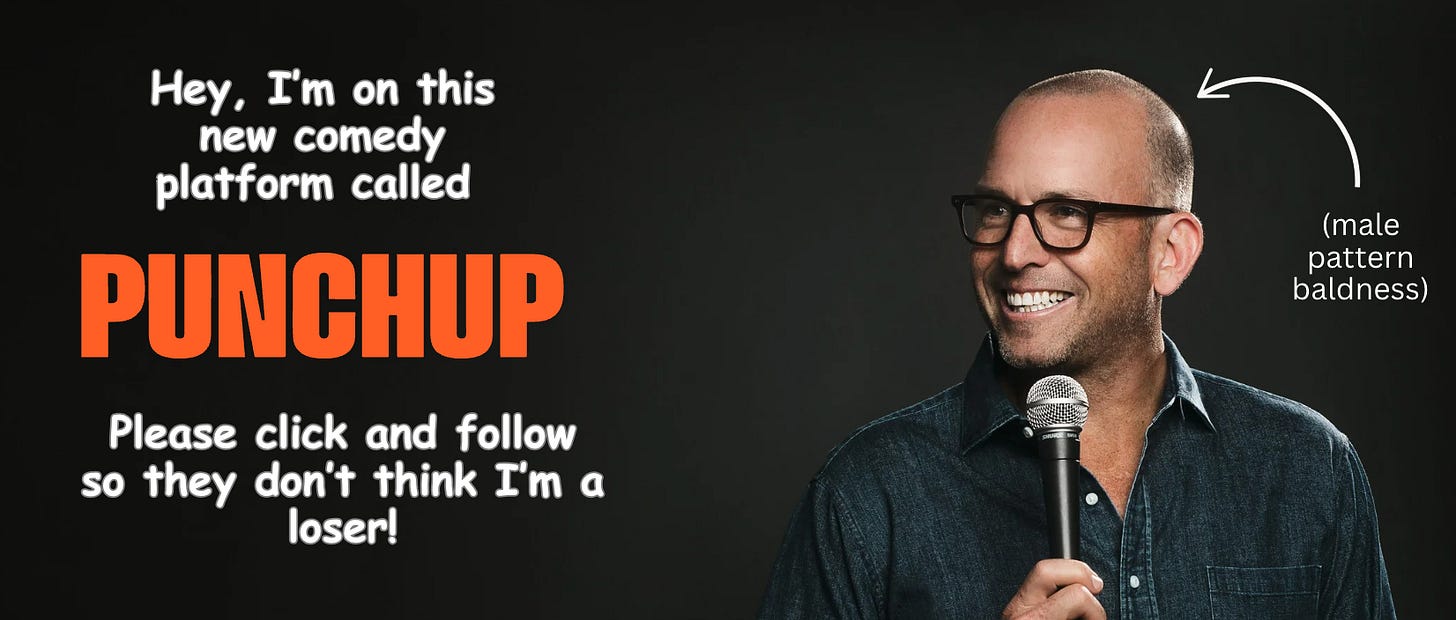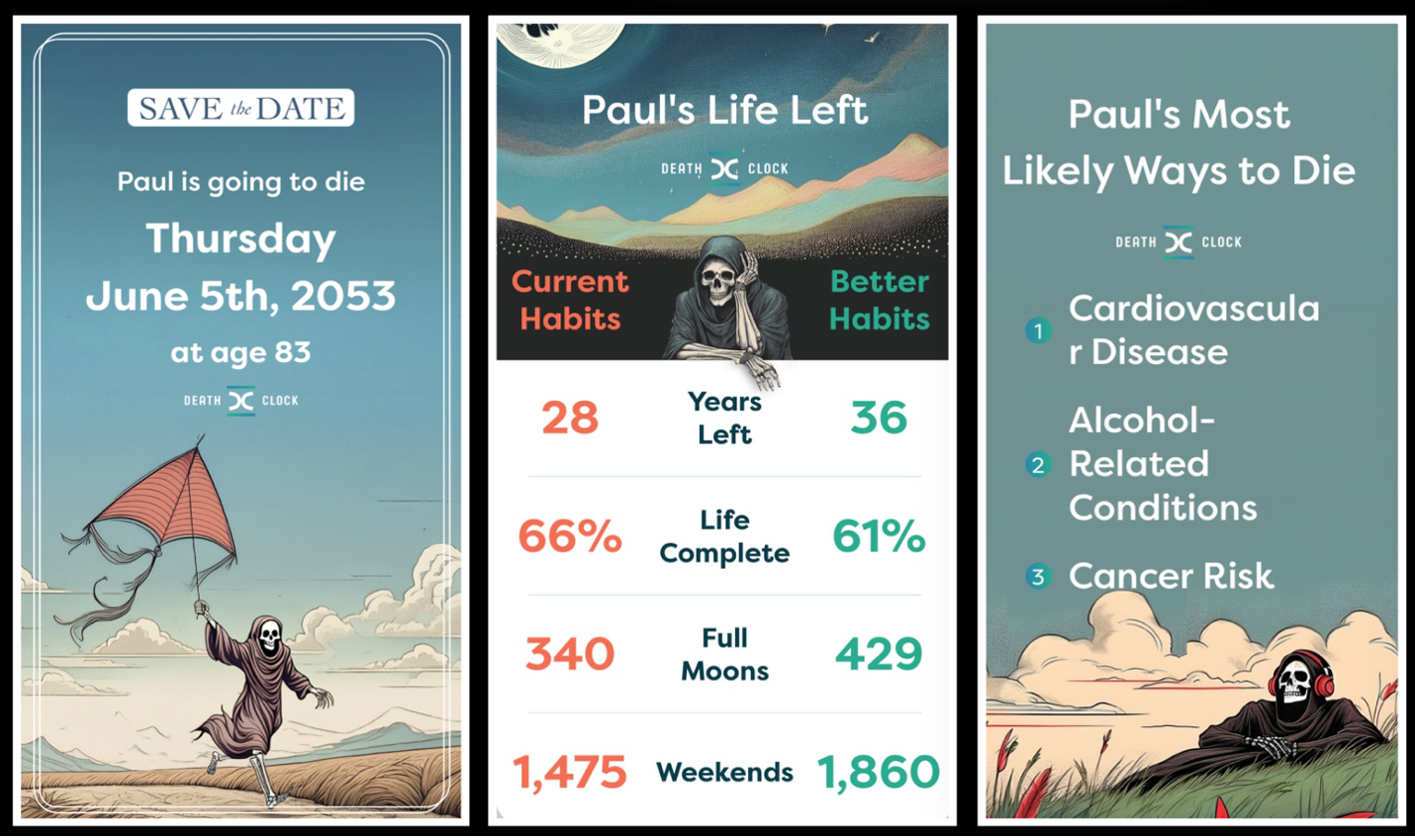Don't Die, Bro!
What's the point of living forever if you can't eat french fries?
THE SELF-PROMOTION:

THE ARTICLE:
I just finished watching the Netflix documentary Don’t Die, which is about Bryan Johnson, a 47-year-old entrepreneur who has structured his life around the pursuit of immortality.
The project’s boldness and the extreme rigor Johnson follows in its pursuit have the world writing him off as a quack. It’s not just that he gobbles handfuls of supplements per day, eats his last meal at 11:30 a.m., monitors the duration of his nighttime erections, and swaps plasma with his 18-year-son. It’s also that his hair and skin treatments give him a creepy plastic glow.
But despite people calling him a “vampire tech bro” and worse, I found him sincere. A bit odd, certainly, but earnest in his motivations and execution. After all, why shouldn’t someone attack the question of immortality, or at least attempt to increase their life expectancy to 150 or 200 years? It may sound bananas, but is the pursuit of a greatly extended survival on earth any stranger than believing in reincarnation or eternal life in Heaven? I don’t think so.
Nevertheless, the whole thing got me reflecting on the nature of time, and how much we have left. I’ve had a small number of friends pass away already, but it’s been easy enough—necessary, perhaps—to attribute their deaths to randomness or lifestyle choices. (Then again, what other causes are there?) It’s not if, it’s when. So…when?
As with all the big questions, I pulled up ChatGPT 4.0 and inquired as to the life expectancy of a US male, age 55. Before you read on, stop and guess what that might be. Also, take a moment to consider how many years you have remaining.
According to ChatGPT’s analysis of actuarial tables, my expected survival is another 20-25 years. In New York state, the average is 23.68 additional years, despite the non-zero likelihood of an insane person setting you ablaze on the subway.
Beyond the net takeaway (“You’ll probably make it to 75”), I found the shape of the curve to be notable. Very few of us (2-5%) will depart prior to age 65, presumably due to a dogged determination to get something from Social Security before we croak. And only another 10-15% will bite it before we hit 7.5 decades.
But after that, we start dropping like Civil War infantry. Of those who make it to our semi-sesquicentennials, approximately 50% will bid farewell in the ensuing ten years. Of course, any of us could die tomorrow—hell, today—but it’s most likely to happen between 2044-54. Mark your calendar.
Given how much I think about this stuff, I shouldn’t have been surprised. But I was. I assumed they’d tell me I was going to make it to 85. I’ve already outlasted the Cold War, Catholic school, and COVID. And since no angry God has yet to smite me due to my impure thoughts, I feel like I should have a shot of hitting the outer limit.
But only 20 years? Hell, two decades ago feels like yesterday. In 2005, I was a legit grown-up with zero roommates. I was almost eight years out of graduate school and had paid off my student loans. Pretty much all my friends were married and procreating, and I was close to parenthood myself, having just met my future wife/baby mama.
20 years ago, a lot of stuff had already happened—the Dotcom Bubble had burst, 9/11 was three years past, and the country was deeply entangled in both Iraq and Afghanistan. I had just bought a new iPod with a free U2 album, had seen the sequels to both Spiderman and Shrek, and Brian Williams had replaced Tom Brokaw as anchor of NBC Nightly News. 20 years is nothing.
A couple days ago, having finished the first draft of this piece (yes, I do multiple drafts), an Instagram ad caught my eye. It was for an app called Death Clock. Of course I clicked, engaged, and filled in answers about my demographics and behavior. The predicted results were more encouraging than those from ChatGPT—I’m actually going to make it to 83. (Hazzah!) However, at that point, I will succumb to my consumption of fatty, wine-soaked meals (see image below). Switching to a diet of steamed kale and purified water might buy me another few years, but that sounds miserable. Besides, at some point, something’s gonna get me.
And despite what Bryan Johnson thinks, something’s going to get him too. Even if the blood transfusions and boner measuring preserve his heart, kidneys and pancreas, he still must avoid getting smooshed by a bus, bit by a cobra, or burned up in the fires raging around Los Angeles, where he lives.
Johnson claims to find great satisfaction in the experiment, and I think that’s significant. Because while his work will contribute positively to the body of human knowledge, the pursuit of maximal longevity ignores another, more important question: how do we make the most of the appallingly limited time that we have? Whether it’s 20 years or 20 days, we should all be striving to make them count.
I hope Netflix produces a sequel to Don’t Die. They should call it Live Well.
THE END (but keep reading…)
I have shows coming up in some cool places. Click HERE for more details
Queens, NY USA - Jan 31
White River Junction, Vermont - Feb 12
The Stand, NYC - Feb 16
Hobart, IN - March 8
Zanies CHICAGO - March 9
COLORADO (Vail, Avon, Aurora, Frisco, Georgetown) - opening for Eddie Ifft March 12-16
Did you catch my recent interview with Deepak Chopra and John Kaag? Me and ‘Pak are pals now.





One's odd of surviving to 80 or 90 (and even 100) have greatly improved. But one's odds of surviving to 110 remain infinitesimal, and surviving to 120 basically zero. Most mammals, including humans, are genetically programed to die at some general lifespan. IMHO, this is because death promotes evolution, so each species' expected life span has been determined by natural selection. For individuals, like an old car, different systems wear out at different times, but the reality is that the longer one lives, the more parts will fail. My father had good skin, excellent heart and lungs, and looked 15 years younger than his calendar age. He had dementia, which made his life miserable, CLL, which exhausted him, and lymphoma, which killed him at 86. As we age, we enter two lotteries: 1) what systems failure will render our life not worth living; and 2) what systems failure will actually kill us.
"You're gonna feel like a damn fool ... laying out at that hospital, dying from nothing !" - Redd Foxx
https://www.youtube.com/watch?v=6grI16niGXA